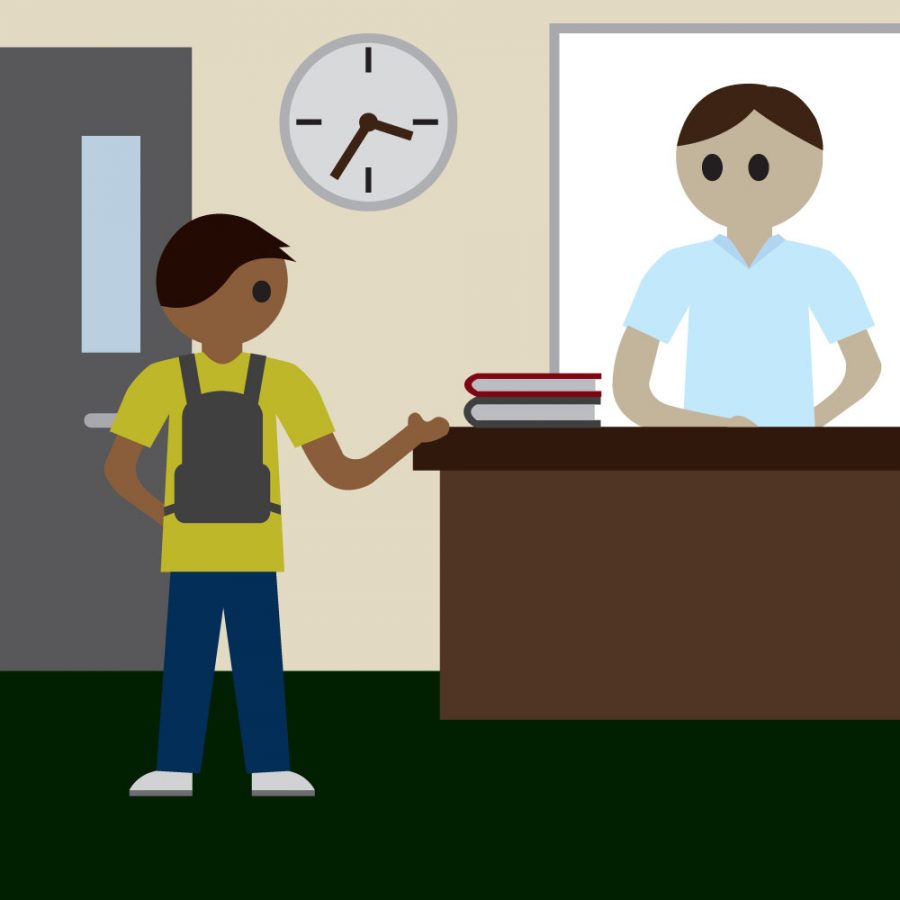May I Have a Word with You?
May 18, 2018
You boot up PowerSchool, and you’re immediately greeted by a ghastly sight: your grade just dipped a full five percent. How can this be?! What to do, what to do… For most, talking to a teacher can seem a formidable feat; but it’s essential to learn to communicate with your teachers when a problem arises. Some of these conversations may not be the easiest to have, but high school is the time when you should prioritize self-advocacy before college hits. But how do you start?
The process begins long before you have anything to bring up to your teachers. It’s considerably easier to start talking to someone you’re familiar with— always maintain a relationship with them. A teacher who knows and trusts you will always be willing to listen to your requests or concerns, and will be more willing to lend a helping hand in times of need. Though it may be hard to see eye to eye with all of your teachers during all four years, always make an effort to remain courteous and friendly to each of them. During the year, also be proactive about learning new things and developing as a person rather than being solely fixated on getting more points and a higher grade.
When you need to reach out, taking the first step and making contact can be nerve-wracking. Schedule a meeting time early on, and don’t forget it! If your teacher has set aside office hours, then make sure you show up. If you’re unsure about their schedule, it’s always safer to email them first. Emails should be brief, and contain a general topic and roughly how long your meeting will take. Always have a goal in mind before you enter the room; what is it that you want your teacher to help you with? You’re not there to argue about anything; the point is to meet in the middle and figure out the course of action for the future. If you’re feeling intimidated, then plan out how you want the conversation to take its course. Practice your talking points, and try to anticipate the different responses you might get for each of them. This will build your confidence and help to eliminate any awkward pauses.
When you finally meet face to face, be respectful. You’re there because you have something you have to ask of someone else— don’t be snobby about it. Never forget that your teacher is a person: they have feelings that can be hurt from the things you do and say. When discussing the issue, always remember to bring up possible solutions, and not more problems. Your teacher is not going to just sit there and listen to you list out all the things that are wrong with your grades— they’re your grades! Take responsibility and work out the problem together, and don’t expect them to hand you the solution. Focus on yourself, and not your teacher; the obstacles you run into in class are often not the result of your teacher, but yourself. Incorporating yourself into the conversation makes you seem less confrontational and demanding, and proves that you are willing to put in the effort to change the situation. Also keep in mind that your teacher does not know you inside and out, and you must address all of the problems you expect them to help you with. You are just one student out of the many classes they teach, so don’t think they’ll cater to your every need.
Once you’re finished, always remember to thank your teacher for taking time out of their day to speak to you. They have busy schedules and enjoy knowing that their work is greatly appreciated.
The prospect of initiating a conversation with an authority figure can be intimidating at times, to say the least. But it’s very necessary throughout your learning career, and going about it the right way can ensure smooth sailing for years to come.

